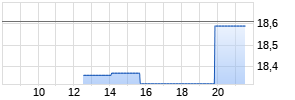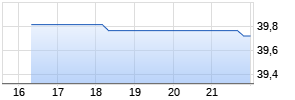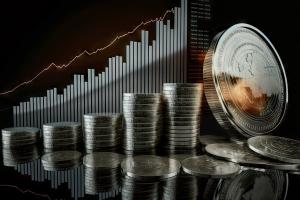
MONDI PLC - Final Results
PR Newswire
London, February 22
Mondi Limited
(Incorporated in the Republic of South Africa)
(Registration number: 1967/013038/06)
JSE share code: MND ISIN: ZAE000156550
Mondi plc
(Incorporated in England and Wales)
(Registered number: 6209386)
LEI: 213800LOZA69QFDC9N34
JSE share code: MNP ISIN: GB00B1CRLC47
LSE share code: MNDI
23 February 2017
As part of the dual listed company structure, Mondi Limited and Mondi plc (together ‘Mondi Group’) notify both the JSE Limited and the London Stock Exchange of matters required to be disclosed under the Listings Requirements of the JSE Limited and/or the Disclosure Guidance and Transparency and Listing Rules of the United Kingdom Listing Authority.
To comply with the requirements in Articles 7 and 9 of the regulatory technical standards of the Transparency Directive (2004/109/EC), this announcement is classified as additional regulated information required to be disclosed under the laws of a Member State.
Full year results for the year ended 31 December 2016
Highlights
- Strong financial performance
- Underlying operating profit of €981 million, up 3%
- Underlying earnings of 137.8 euro cents per share, up 3%
- Cash generated from operations of €1,401 million, up 10%
- Return on capital employed of 20.3%
- Capital projects delivering growth
- Completed major projects contributed incremental €50 million to underlying operating profit in 2016
- Strong expansionary capital investment pipeline: over €800 million in major projects approved and in progress
- Four acquisitions totalling €185 million, expanding our packaging interests
- Implemented Growing Responsibly model, defining our sustainability commitments to 2020
- Recommended full year dividend of 57.0 euro cents per share, up 10%
Financial Summary
| € million, except for percentages and per share measures | Year ended 31 December 2016 | Year ended 31 December 2015 | Change % | Six months ended 31 December 2016 | Six months ended 31 December 2015 | Change % |
| Group revenue | 6,662 | 6,819 | (2) | 3,350 | 3,360 | — |
| Underlying EBITDA1 | 1,366 | 1,325 | 3 | 652 | 654 | — |
| Underlying operating profit1 | 981 | 957 | 3 | 452 | 467 | (3) |
| Operating profit | 943 | 900 | 5 | 414 | 449 | (8) |
| Profit before tax | 843 | 796 | 6 | 361 | 404 | (11) |
| Per share measures | ||||||
| Basic underlying earnings per share1 (euro cents) | 137.8 | 133.7 | 3 | |||
| Basic earnings per share (euro cents) | 131.8 | 124.0 | 6 | |||
| Total dividend per share (euro cents) | 57.0 | 52.0 | 10 | |||
| Cash generated from operations | 1,401 | 1,279 | 10 | |||
| Net debt | 1,383 | 1,498 | ||||
| Group return on capital employed (ROCE)2 | 20.3% | 20.5% |
Notes:
1 The Group presents underlying EBITDA, operating profit and related per share information as measures which exclude special items in order to provide a more effective comparison of the underlying financial performance of the Group between financial reporting periods. A reconciliation of underlying operating profit to profit before tax is provided in note 3 of the condensed financial statements.
2 ROCE is underlying operating profit expressed as a percentage of the average capital employed for the year, adjusted for impairments and spend on strategic projects which are not yet in operation.
David Hathorn, Mondi Group chief executive, said:
"I am pleased to announce another strong performance, building on our track record of steadily improving profitability over the last five years. Underlying operating profit was up 3% to €981 million and our return on capital employed was 20.3%.
We saw good contributions from all our businesses despite pricing headwinds in a number of key paper grades.
We made considerable progress in driving growth through our capital investment programme, delivering incremental operating profit of around €50 million in 2016 from recently completed capital projects, with a further €30 million anticipated in 2017. In addition to our significant pipeline of projects already in progress, the Boards have approved the replacement of the recovery boiler at our Steti mill in the Czech Republic and installation of a 90,000 tonne per annum machine glazed speciality kraft paper machine for a total investment of €470 million.
We completed four acquisitions totalling €185 million in 2016, enhancing our product offering and geographic reach in our Corrugated and Consumer Packaging businesses.
Our outlook for the business is positive. We have implemented or announced price increases in containerboard, sack kraft and uncoated fine paper grades, supported by good demand. We expect some inflationary cost pressures across the Group and a lower forestry fair value gain. Furthermore, we anticipate a more challenging trading environment in certain uncoated fine paper markets following price erosion in Europe over the course of 2016, combined with emerging market currency volatility. However, we expect to continue to benefit from contributions from our recently completed capital projects and acquisitions, together with steady organic growth in our downstream converting businesses.
Our consistent and focused strategy, robust business model and firm focus on operational excellence all continue to contribute to our performance. We remain confident of continuing to deliver industry-leading returns."
Group performance review
Our strong performance in 2016 builds on our track record of continuous improvement in profitability over the last five years. Our consistent and focused strategy, robust business model and firm focus on operational excellence all continued to contribute to our performance.
Group revenue of €6,662 million was down 2% on the prior year. Excluding the impact of currency movements, revenue was in line with the prior year. Good volume growth in Packaging Paper and Consumer Packaging and higher domestic selling prices in South Africa and Russia were offset by lower average selling prices in Packaging Paper and Fibre Packaging.
Underlying operating profit of €981 million was up 3% on the prior year. Packaging Paper was negatively impacted by lower selling prices across most key grades and lower green energy prices, partially offset by like-for-like sales volume growth. Fibre Packaging continued its positive development, with volume growth in Corrugated Packaging and a good performance from the core European industrial bags business, partly offset by negative currency translation effects and ongoing challenges in the US industrial bags business. We continue to make good progress in Consumer Packaging with strong volume growth and improving margins. In Uncoated Fine Paper, Russian domestic price increases and a strong focus on productivity and efficiency more than offset negative currency effects from the weaker rouble and flat average European pricing. Our South Africa Division was negatively affected by sharply lower average export pulp selling prices and higher input costs which were only partially offset by positive currency effects and a higher fair value gain on forestry assets. After taking the impact of special items of €38 million into consideration, operating profit of €943 million was up 5% (2015 : €900 million).
Our passion for performance is central to the way we run our business and is demonstrated through a continuous focus on quality, productivity and efficiency. We invest in our existing operations and, where appropriate, in strategic acquisitions to strengthen our cost advantages, generate synergies through integration and enhance our product and service offering and/or geographic reach to better serve our customers. In 2016 our recently completed capital investments contributed around €50 million in incremental operating profit. We completed four acquisitions during the year: two corrugated packaging acquisitions, SIMET in Poland and Lebedyan in Russia; and two in Consumer Packaging, Kalenobel in Turkey and Uralplastic in Russia. In February 2017, we announced the acquisition of Excelsior Technologies Limited in the UK, further supporting the development of Consumer Packaging.
The impact of maintenance shuts on underlying operating profit in 2016 was around €75 million (2015: €90 million), slightly above expectation due to a longer than anticipated shut at our Richards Bay mill (South Africa). Based on prevailing market prices, we estimate that the impact of planned maintenance shuts on underlying operating profit in 2017 will be around €80 million.
Input costs were generally lower across our European businesses. Wood costs were lower than the prior year with a stable supply and demand balance. Average benchmark costs for paper for recycling were up around 11% on 2015 as prices increased in the second half of the year on strong export demand and increased European consumption. Energy costs were lower than the prior year due to lower average crude oil and gas prices. Looking forward, rising commodity input costs are expected to put some upward pressure on energy costs. Following the significant volatility in polyethylene prices in 2015, pricing was more stable during the year, but on average at similar levels to the prior year. In our South Africa Division, inflationary pressures and higher imported costs resulted in an increase in input costs.
Volatility in foreign exchange rates had a net negative impact on underlying operating profit of €31 million. The weakening of a number of emerging market currencies, particularly the Russian rouble, Turkish lira, Polish zloty and Mexican peso, had a negative impact on translation of the profits of our Fibre Packaging and domestically focused Russian uncoated fine paper operations, while our South Africa Division benefited from the weakening of the rand due to its significant export position.
Our cash generation remained strong with cash generated from operations of €1,401 million up 10% on the prior year. Net debt reduced by €115 million to €1,383 million, or 1.0 times EBITDA.
Underlying earnings of 137.8 euro cents per share were up 3% compared to 2015. After taking the effect of special items into account, basic earnings of 131.8 euro cents per share were up 6% compared to 2015.
Our Boards have recommended payment of a final dividend of 38.19 euro cents per share, bringing the total dividend for the year to 57.0 euro cents per share, an increase of 10% on 2015.
Packaging Paper (Europe & International Division)
| € million | Year ended 31 December 2016 | Year ended 31 December 2015 | Change % | Six months ended 31 December 2016 | Six months ended 31 December 2015 | Change % |
| Segment revenue | 2,056 | 2,156 | (5) | 1,011 | 1,034 | (2) |
| Underlying EBITDA | 483 | 505 | (4) | 232 | 239 | (3) |
| Underlying operating profit | 361 | 391 | (8) | 169 | 180 | (6) |
| Underlying operating profit margin | 17.6% | 18.1% | 16.7% | 17.4% | ||
| Special items | — | (14) | — | — | ||
| Capital expenditure | 156 | 259 | 86 | 155 | ||
| Net segment assets | 1,760 | 1,753 | ||||
| ROCE | 22.4% | 25.5% |
Profitability in Packaging Paper, down 8% on the prior year, was impacted by lower average selling prices across most key grades, lower green energy prices and the loss of contribution from the Raubling mill sold during 2015, partially offset by the benefits of completed capital investment projects. However, the business unit delivered a strong ROCE performance of 22.4%.
On a like-for-like basis, excluding the impact of the sale of the Raubling mill, sales volumes were marginally up across all containerboard grades.
As anticipated, we saw some price erosion in the kraftliner grades in the first half of the year. While demand growth remained solid, the market came under some pressure from increased supply from new capacity in Europe and competition from importers benefiting from weak emerging market currencies. Average European benchmark selling prices for unbleached kraftliner were down 5% on the prior year and white-top kraftliner prices were down around 2%. Supported by sustained good demand and a strong order position, a price increase of €20 per tonne was implemented for unbleached kraftliner in August across all European markets excluding southern Europe, partly offsetting the price erosion seen over the course of the first half of the year. In Russia, price increases for white-top kraftliner were implemented at the beginning of 2016 and remained stable throughout the year.
In response to strong demand, price increases of €50 per tonne were recently implemented on all unbleached kraftliner grades in Europe, effective from March 2017. A price increase of €50 per tonne has also been announced for white-top kraftliner to take effect from the beginning of the second quarter of 2017. In Russia, prices for white-top kraftliner were increased from the beginning of 2017.
Average European benchmark selling prices for recycled containerboard were down 3% on the prior year period. Price increases of €40 per tonne were achieved from February 2017 and a further increase of €40 per tonne has been announced to take effect from the beginning of the second quarter of 2017.
Sales volumes for sack kraft paper increased compared to the prior year, benefiting from good demand, fewer planned maintenance shuts and productivity improvements. Average selling prices for sack kraft paper produced in Europe declined by 5-6% in the early part of 2016 and remained at those levels through the balance of the year. Given strong demand, selling prices were increased by 3-4% from the beginning of 2017 in all markets.
We saw good demand across our range of speciality kraft papers, although sales volumes of certain grades were impacted by the closure of high cost production capacity in 2015. Selling prices were, on average, marginally lower than in the prior year.
We have completed a number of investments across our mills in recent years and our focus in 2016 was on fully realising the benefits of these investments. These benefits include a reduction in energy costs at our Swiecie mill (Poland) following the completion in 2015 of the new recovery boiler, and improved productivity following the completion of a number of smaller investments across our production base.
Input costs were at a similar level to the prior year with the business benefiting from cost savings initiatives and generally lower raw material and energy costs which offset higher paper for recycling costs and other inflationary increases. Green energy prices were significantly lower in Poland due to legislative changes, resulting in a €20 million reduction in income from green energy credits compared to the prior year, including the impact of a write-down of €6 million in the carrying value of the inventory of green energy credits held at year end.
Planned maintenance shuts at our Syktyvkar (Russia) and Swiecie (Poland) mills were completed during the first half of the year, and a further planned maintenance shut at Swiecie and the majority of our kraft paper mill shuts were completed in the second half of the year. A similar planned maintenance schedule is anticipated in 2017 although the shuts at our Swiecie and Steti mills will be extended as we progress our major capital investments in those operations.
Fibre Packaging (Europe & International Division)
| € million | Year ended 31 December 2016 | Year ended 31 December 2015 | Change % | Six months ended 31 December 2016 | Six months ended 31 December 2015 | Change % |
| Segment revenue | 1,929 | 2,031 | (5) | 961 | 985 | (2) |
| Underlying EBITDA | 194 | 187 | 4 | 100 | 86 | 16 |
| Underlying operating profit | 123 | 120 | 3 | 64 | 52 | 23 |
| Underlying operating profit margin | 6.4% | 5.9% | 6.7% | 5.3% | ||
| Special items | (13) | (21) | (13) | (11) | ||
| Capital expenditure | 107 | 118 | 57 | 60 | ||
| Net segment assets | 1,006 | 935 | ||||
| ROCE | 13.5% | 13.9% |
In Fibre Packaging our underlying operating profit increased 3% to €123 million and ROCE was 13.5%, with volume growth in Corrugated Packaging and a good performance from the core European industrial bags business partly offset by negative currency translation effects and ongoing challenges in the US and CIS industrial bags businesses.
Corrugated Packaging achieved good organic volume growth, particularly in the Czech Republic and Germany, supplemented by two acquisitions to expand our corrugated network. Mondi SIMET S.A. (Poland) complements our existing geographic footprint, allows for logistics optimisation and provides increased production capacity in the growing Polish market. We started building work for the conversion of this plant to a high-efficiency, heavy-duty box plant early in 2017. Mondi Lebedyan (Russia) provides us with excellent opportunities in the local agricultural market and increases our ability to serve our multinational customers. Sales volumes were negatively impacted in Turkey, due to ongoing political turbulence in the region, and Poland, where sales growth was tempered by the Russian embargo preventing the export of fresh fruit and vegetables to that market. Profitability was also negatively affected by the weaker Turkish lira and Polish zloty. Over the last two years, we have invested significantly in all our corrugated operations, helping us to better serve our customers and meet their more sophisticated product needs. The business benefited from lower paper input costs and productivity gains.
In Industrial Bags, while European markets remained robust, the business was negatively impacted by challenging market conditions in the US and CIS. Overall, sales volumes declined 1% with good growth in Europe and the Middle East offset by declines in the US and CIS. The breadth and geographic reach of our Industrial Bags network gives us the unique ability to fully optimise our production network to better serve our customers. In 2016, we closed our facility at Sendenhorst (Germany), while continuing to serve our customers from other sites and, in December 2016, announced the closure of our facility in southern Belgium. We have also significantly increased the level of exports from our Mexican operations into the US, and started production at our new operation in Cote d'Ivoire. Lower sales volumes were partly compensated by significant cost savings resulting from a strong focus on cost management and the benefits of the restructuring and rationalisation activities. The weaker Mexican peso had a negative impact on the translation of profits from our Mexican operations.
Consumer Packaging (Europe & International Division)
| € million | Year ended 31 December 2016 | Year ended 31 December 2015 | Change % | Six months ended 31 December 2016 | Six months ended 31 December 2015 | Change % |
| Segment revenue | 1,562 | 1,469 | 6 | 797 | 739 | 8 |
| Underlying EBITDA | 198 | 177 | 12 | 98 | 94 | 4 |
| Underlying operating profit | 121 | 108 | 12 | 57 | 59 | (3) |
| Underlying operating profit margin | 7.7% | 7.4% | 7.2% | 8.0% | ||
| Special items | (19) | (22) | (19) | (7) | ||
| Capital expenditure | 91 | 92 | 49 | 42 | ||
| Net segment assets | 1,270 | 1,146 | ||||
| ROCE | 10.5% | 10.7% |
Consumer Packaging made good progress with strong volume growth and improving margins. Underlying operating profit increased 12% to €121 million with a ROCE of 10.5%.
Good progress was made in our ongoing initiatives to improve the product mix. Strong volume growth was achieved in our higher value-added segments of personal care components, consumer laminates, technical films, and release liners. The favourable product mix and focus on value-added segments resulted in an improvement in our gross margin. On a like-for-like basis, excluding the impact of acquisitions and disposals, sales volumes grew around 4%. We remain well positioned for further growth.
The integration of the businesses acquired during 2015 is progressing well and we are realising the synergies from these acquisitions. Two further acquisitions were completed in 2016, growing our product offering and geographic reach. Mondi Kalenobel (Turkey) produces flexible consumer packaging for ice cream and other applications, as well as aseptic cartons, and serves both international FMCG companies and regional food and beverage producers. The company exports approximately half of its production - mainly to Western Europe, the Middle East, and North Africa. Mondi Uralplastic (Russia) manufactures a range of consumer flexible packaging products for food, personal care, homecare, and other applications for both local and international customers. A small net charge to underlying operating profit was incurred from these acquisitions in the second half of the year due to the effects of acquisition accounting and transaction costs.
In February 2017, we announced the acquisition of Excelsior Technologies Limited in the UK, further supporting the development of Consumer Packaging in high growth product applications. Excelsior is a vertically-integrated producer of innovative flexible packaging solutions, mainly for food applications, with a unique packaging technology for microwave steam cooking, complementing and enhancing our global food packaging offering.
We completed the closure of operations in Italy and Spain, announced in 2015, while retaining the ability to continue to serve customers from our sites in central and eastern Europe. During 2016, we further debottlenecked some of our plants and reallocated production between our sites to allow for site specialisation, optimised production activities, cost savings, productivity improvements, and reduced waste. In the US, we announced the restructuring of our release liner operations, including the closure of one site. We appointed a chief innovation officer and reorganised our research and development activities to further strengthen our capabilities in this area. Fixed costs were higher, in line with our increased focus on innovation and customer service, partially offset by one-off gains in the first half of the year.
Uncoated Fine Paper (Europe & International Division)
| € million | Year ended 31 December 2016 | Year ended 31 December 2015 | Change % | Six months ended 31 December 2016 | Six months ended 31 December 2015 | Change % |
| Segment revenue | 1,246 | 1,233 | 1 | 621 | 607 | 2 |
| Underlying EBITDA | 343 | 291 | 18 | 171 | 139 | 23 |
| Underlying operating profit | 264 | 212 | 25 | 131 | 99 | 32 |
| Underlying operating profit margin | 21.2% | 17.2% | 21.1% | 16.3% | ||
| Capital expenditure | 53 | 65 | 26 | 33 | ||
| Net segment assets | 851 | 821 | ||||
| ROCE | 36.0% | 25.6% |
Our Uncoated Fine Paper business delivered an exceptional performance, generating underlying operating profit of €264 million, up 25% on the prior year, with a ROCE of 36%. Domestic price increases in the CIS markets and a strong focus on productivity and efficiency more than offset negative currency effects from the weaker rouble and flat European pricing.
Uncoated fine paper sales volumes increased 1% over the prior year, reflecting a strong performance in an overall declining market. European market demand is estimated to have contracted in 2016 by 3-4%, following stable demand in 2015, bringing the average demand contraction over the past two years to 1-2% per year, in line with the longer-term trend. Demand in the CIS remained stable.
Benchmark average selling prices in Europe were similar to the prior year, but 2% down in the second half of the year compared to the first half. Selling price increases were implemented at the beginning of the year but came under pressure early in the second half due to weak European demand and pressure from imports offsetting the benefits of industry capacity rationalisation in the prior year. Demand improved towards the end of year and a price increase of 5-7% has been announced across all uncoated fine paper grades in Europe from February 2017.
Selling prices were increased in Russia at the beginning of 2016, offsetting the effects of domestic cost inflation. Prices remain stable going into 2017.
The business benefited from generally lower input costs, particularly energy costs. In Russia, wood costs were lower in rouble terms, while in Europe wood costs increased marginally. Our commercial excellence programmes, focused on purchased material, operating efficiencies and productivity improvements, contributed to good cost control, offsetting inflationary cost pressures, most notably in Russia. Hardwood pulp prices were 11% lower in euro terms providing a benefit to our semi-integrated Neusiedler (Austria) operations.
Planned maintenance shuts were completed at Syktyvkar in the first half of the year, at Ruzomberok in both the first and second half, and at Neusiedler in the second half of the year. In 2017, our Syktyvkar shut is planned for the first half of the year and our Ruzomberok and Neusiedler mill shuts are scheduled for the second half.
South Africa Division
| € million | Year ended 31 December 2016 | Year ended 31 December 2015 | Change % | Six months ended 31 December 2016 | Six months ended 31 December 2015 | Change % |
| Segment revenue | 594 | 652 | (9) | 304 | 338 | (10) |
| Underlying EBITDA | 182 | 199 | (9) | 68 | 110 | (38) |
| Underlying operating profit | 147 | 161 | (9) | 49 | 92 | (47) |
| Underlying operating profit margin | 24.7% | 24.7% | 16.1% | 27.2% | ||
| Special items | (6) | — | (6) | — | ||
| Capital expenditure | 58 | 61 | 33 | 29 | ||
| Net segment assets | 731 | 563 | ||||
| ROCE | 27.8% | 30.1% |
Our South Africa Division was negatively affected by sharply lower average pulp export selling prices and higher input costs which were only partially offset by positive currency effects, a higher fair value gain on forestry assets and domestic price increases. Underlying operating profit of €147 million was down 9% on a very strong performance in the prior year and ROCE was 27.8%.
Strong domestic demand for uncoated fine paper and white-top kraftliner was met by reducing exports of these products and increasing the amount of pulp converted to these paper grades. Domestic demand for pulp decreased, compensated by a higher level of exports. Overall, sales volumes were marginally lower than in the prior year.
Domestic selling prices were higher across all our grades. Export prices for white-top kraftliner were broadly in line with the prior year and average benchmark US dollar pulp prices were around 11% lower than the previous year. Lower export prices were partially compensated by the weaker rand.
Forestry gains are dependent on a variety of factors over which we have limited control. In 2016, selling prices of timber increased significantly and a fair value gain of €64 million (2015: €40 million) was recognised, of which €48 million was recognised in the first half of the year. The increase in the fair value gain was offset by the consequent impact of higher felling costs.
Inflationary price increases in labour and electricity, higher wood costs mainly due to the forestry revaluation, and the impact of the weaker South African rand on imported materials put pressure on input costs. These impacts were partially mitigated by our focus on cost optimisation, driving efficiencies and reducing waste.
An extended planned maintenance shut at Richards Bay, which included the tie-in of our recent capital investments, took place during the second half of 2016 and a much shorter shut is planned for the second half of 2017.
Special items
Special items are those items of financial performance that we believe should be separately disclosed to assist in the understanding of our underlying financial performance. Special items are considered to be material either in nature or in amount.
The net special item charge of €38 million before tax comprised the following:
• Restructuring and closure costs of €17 million and related impairments of €15 million for the closure of an Industrial Bags (Fibre Packaging) plant in southern Belgium and restructuring of our US release liner business (Consumer Packaging), including the closure of one operation.
• In our South Africa Division, we took the decision to restart our second uncoated fine paper machine to meet domestic demand for reels and, at the same time, reduce our production of newsprint in response to declining demand. This gave rise to a further impairment of the newsprint assets of €7 million, the reversal of impairment of the uncoated fine paper assets of €2 million, and restructuring costs of €1 million.
Further detail is provided in note 4 of our condensed combined and consolidated financial statements.
Tax
Based on our geographic profit mix and the applicable tax rates, we would expect our tax rate to be around 22%. However, we benefited from tax incentives related to our capital investments in Slovakia, Poland and Russia. In addition, we recognised deferred tax assets related to previously unrecognised tax losses which we now expect to be able to utilise in the coming years. As such, our underlying tax charge for 2016 of €166 million (2015: €161 million) reflects an effective tax rate of 19%, consistent with 2015. Tax relief on special items amounted to €9 million (2015: €10 million).
Tax paid in 2016 of €173 million (2015: €160 million) is higher than the 2016 tax charge as a result of the timing of final tax payments for 2015 and earlier financial years.
Going forward, assuming a similar profit mix, we would anticipate marginal upward pressure on the tax rate over the next three years as it moves towards the expected tax rate of 22%.
Cash flow
Our cash generation remained strong. In 2016, the cash generated from our operations was €1,401 million, up 10%. On average over the last five years, cash generated from operations has increased by 10.5% per year.
Working capital as a percentage of revenue was 12%, marginally up on the prior year (11.6%). The net cash inflow from movements in working capital during the year was €68 million (2015: inflow of €9 million).
We paid dividends of €274 million to shareholders (2015: €209 million). Interest paid of €82 million (2015: €93 million) was lower than the prior year, mainly due to the lower average net debt and composition of our borrowings.
In 2016, we invested €465 million (2015: €595 million) in capital expenditure and completed four acquisitions with a total purchase price, on a debt and cash free basis, of €185 million.
Capital investments
Investing in our high-quality, low-cost assets to maintain and enhance our competitive advantage is of particular importance in our pulp and paper assets where products are generally more commoditised and low-cost production is key. Our focus is on enhancing our cost competitiveness, improving energy efficiency, meeting the needs of our customers and delivering organic growth in our packaging businesses.
Our disciplined approach to investigating, approving and executing capital projects is one of our key strengths and plays an important role in successfully delivering the returns we require. Over the last three years, our major capital projects have contributed around €150 million of incremental operating profit, including €50 million in 2016, and we expect to generate a further €30 million in 2017.
We are in the process of commissioning the second phase of our project at Swiecie (Poland), which will provide an additional 100,000 tonnes per annum of softwood pulp and 80,000 tonnes per annum of lightweight kraftliner. At our Steti mill (Czech Republic), the ramp-up of our rebuilt paper and inline coating machine has been slower than anticipated. We have allocated additional capital to meet quality requirements that are higher than the original project specifications, and expect to ramp up production over the course of 2017.
Towards the end of 2016 we completed the investment project to upgrade the woodyard at our Richards Bay mill (South Africa), which has significantly improved efficiencies at the mill and facilitated improved efficiencies in wood handling processes in our forests, providing higher-quality fibre, reduced maintenance costs, improved reliability, and some energy savings. Our investment to produce unbleached kraftliner in addition to white-top kraftliner at our Richards Bay mill gives us the opportunity to supply our customers with this specialised product.
In recent years, we have invested significantly in the modernisation and growth of our Corrugated Packaging and Consumer Packaging businesses. Looking forward, while still considering capital investment opportunities in these businesses, we are focused on the optimisation of our existing operations and recent investments.
We have a strong pipeline of large projects over the next few years:
• The new 300,000 tonne per annum kraft top white machine at Ruzomberok (€310 million). This project remains subject to obtaining approval of tax incentives from the European Commission and necessary permitting.
• During 2016, the Boards approved a new woodyard and bleaching line modernisation at Steti (€41 million).
• In January 2017, the Boards approved a further €470 million for the replacement of the recovery boiler at Steti, the rebuild of the fibre lines, the debottlenecking of the paper machines and an investment in a new 90,000 tonnes per annum machine glazed speciality kraft paper machine. This project remains subject to obtaining tax incentives and necessary permitting.
Given the approved project pipeline, our annual capital expenditure is expected to be in the range of €600-650 million in 2017 and €800-850 million in 2018 as expenditure on these large projects accelerates.
Mehr Nachrichten zur Mondi plc Aktie kostenlos abonnieren
(Mit der Bestellung akzeptierst du die Datenschutzhinweise)

Hinweis: ARIVA.DE veröffentlicht in dieser Rubrik Analysen, Kolumnen und Nachrichten aus verschiedenen Quellen. Die ARIVA.DE AG ist nicht verantwortlich für Inhalte, die erkennbar von Dritten in den „News“-Bereich dieser Webseite eingestellt worden sind, und macht sich diese nicht zu Eigen. Diese Inhalte sind insbesondere durch eine entsprechende „von“-Kennzeichnung unterhalb der Artikelüberschrift und/oder durch den Link „Um den vollständigen Artikel zu lesen, klicken Sie bitte hier.“ erkennbar; verantwortlich für diese Inhalte ist allein der genannte Dritte.





